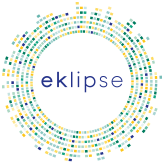Eklipse answers requests related to biodiversity and ecosystem services. The different steps of our request process are as follows:
Process
Eklipse process
What makes Eklipse different is its robust process when answering the need for evidence in order to ensure knowledge synthesis is perceived as credible, relevant and legitimate and can also be used, even on contested issues.
Eklipse regularly launches Calls for Requests where policy and other societal actors identify topics or evidence needs requiring in-depth analysis and a consolidated view from science and other knowledge holders.
1. Pre-screening phase
Requesters are invited to submit their knowledge needs during regular open Calls for Requests. These requests are pre-screened by the Eklipse Knowledge Coordination Body (KCB), supported by Eklipse Strategic Advisory Board (SAB). The pre-screening aims at identifying the policy and societal relevance of the request at the European level as well as the general needs of the requester, resources available and the timeframe (See the Guidance Note 7a to know more about selection criteria). Once the KCB agrees that a request meets Eklipse criteria, it is selected to go to the scoping phase.
2. Scoping phase
A scoping group is put in place composed at least a KCB Focal point, a Deputy, a Methods Expert Group (MEG) representative and an Eklipse Management Body (EMB) contact point. The scoping group liaises with the requester during the scoping phase in order to refine the question and identify how Eklipse could provide an added value. The MEG supports the scoping group, advising on methods and approaches for answering the request. This scoping phase usually also involves looking for knowledge and expertise on the refined question via an open Call for Knowledge using social media forums. Once the KCB and the requester agree on the reformulation, the request can move forward and the answering process can start.
3. Answering phase
Based on the work during the Scoping Phase, a Document of Work (DoW) is developed under the supervision of the scoping group in close collaboration with the requester (3a in figure above). The DoW provides the background, aims, time frame and relevance of the request, describing in particular: why the request has been put forward, what the requester wants from the process, the European policy relevance of the request, the resources, and the potential methods identified to answer the request. Depending on the type of request and the advised method(s), different types of approaches can be considered (See below the four categories of requests: Horizon Scanning, Knowledge Synthesis, Societal Engagement and support initiative).
4. Final Synthesis
Requesters receive targeted responses based on the best available knowledge within 6-18 months, depending on their needs and the complexity of their request. All final synthesis and additional end product(s) are widely disseminated and made publicly available.
Answering phase
Four different types of requests and the crucial role of experts
Requests are categorised in one of the four groups described below, according to the type of procedure for answering the request.
Horizon Scanning requests
They aim at identifying key emerging issues and research priorities, jointly with actors from different scientific disciplines, practice, policy and society, across various sectors and countries in Europe.
These requests usually involve a call for experts aiming to create a topical Expert Working Group (EWG) which will work within all the guidelines agreed in the DoW. The EWG then develops a background report with the support of the Knowledge Coordination Body (KCB)and the Methods Expert Group (MEG) describing the current knowledge gaps and research needs on the topic. This document/report goes through an extensive peer review process which involves an open consultation with knowledge holders of that particular topic.
Examples of past requests
Knowledge Synthesis requests
They are designed to enable policy-makers and other societal actors to make use of existing studies by synthesising available knowledge. This process is particularly helpful for requests which require an in-depth collection, analysis and synthesis of existing knowledge from the scientific literature and other sources. It can also help decision-makers identify knowledge gaps. These requests also involve a call for experts and the creation of an Expert Working Group (EWG).
The selected EWG develops a methods protocol with the support of the Methods Expert Group (MEG) which describes the current knowledge gaps and research needs on the topic. This methods protocol goes through an extensive peer review process which involves an open consultation with the public and all knowledge holders of that particular topic (see a previous example here).
Next, the EWG synthesises all current knowledge and produces a final output, (e.g. a report, policy brief, workshop report – depending on the needs of the requester, as identified during the scoping phase). Then a peer-review is conducted to make sure the output is robust and credible.
The end product is then given to the requester and, finally, it is widely disseminated and made publicly available.
Examples of past requests
Societal Engagement requests
They are aimed at promoting societal debate and engagement on biodiversity and ecosystem services by:
- improving understanding of public perceptions on biodiversity
- facilitating public debates as well as open exchange of research results
- ensuring that civil society and/or businesses are informed and engaged on biodiversity
In the case of a Societal Engagement request, once the DoW is agreed, the activities planned to open the discussion among different actors are put in place (e.g. Science Cafes, public surveys, videos, etc…). These societal engagement activities are widely promoted on social media.
Next, the result of the engagement activities are synthesised in the draft output, (e.g. a report, video,). Then a peer-review is conducted to make sure the final output is robust and credible.
Example of past request
Support Initiatives requests
They aim at providing support and facilitating key ongoing discussions and initiatives related to biodiversity and ecosystems services at the local, national and global level (e.g. IPBES 7, COP-14). These requests also involve a call for experts and the creation of an Expert Working Group (EWG)
The selected Expert Working Group (EWG) develops a facilitation scheme based on the characteristics of the event or initiative to which we are contributing. This facilitation scheme goes through an extensive peer review process which involves an open consultation with the public and all relevant knowledge holders of that particular topic (see a previous example here).
Based on the DoW and the facilitation scheme, the EWG contributes to the initiative or event.
Next, the EWG synthesises all the current knowledge and produces a draft output, (e.g. a report, policy brief, workshop report). Then a peer-review is conducted to make sure the final output is robust and credible.




